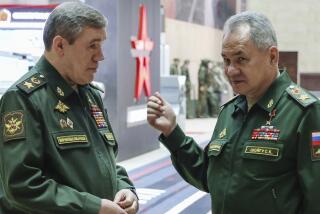Panel Targets Yeltsin’s Foes on Corruption
- Share via
MOSCOW — An anti-corruption commission appointed by Boris N. Yeltsin on Wednesday accused two key government figures and political rivals of the Russian president of corruption.
Vice President Alexander V. Rutskoi was charged with having at least two country houses and a secret Swiss bank account, and General Prosecutor Valentin G. Stepankov was accused of discussing the murder of a political foe.
The commission also alleged that a vast net of corruption taints at least three other Yeltsin administration officials and unnamed lawmakers.
All were said to be linked to a shadowy private company that allegedly laundered Communist Party money, illegally exported millions of dollars’ worth of Russian natural resources with the connivance of powerful government officials and stashed the profits in Western bank accounts.
Corruption charges have become a weapon in the political battle between Yeltsin and his enemies in Parliament.
Rutskoi, a conservative former ally who openly split with Yeltsin to become a leading opposition figure, plans to run for president in the next election. Yeltsin has already called on Rutskoi to resign, severely curtailed his responsibilities and slashed his staff.
Stepankov had recently sided with Parliament in a corruption probe of two top Yeltsin aides.
Some critics dismissed the new corruption charges as simply retaliation by the Yeltsin camp. Others saw the move as a purge of disloyal officials as Yeltsin prepares for a new showdown with the conservative Parliament this fall.
“Political developments have always been based on vengeance in this country,” said Alexander A. Shalnev, a political analyst for the Izvestia newspaper. “The unwritten rule is as follows: You hit me or any of my friends, and I hit you.”
The corruption scandal comes on the anxious eve of the second anniversary of the failed 1991 coup by Communist hard-liners. Yeltsin, whose defiant stance atop a tank helped protect the Parliament building, is now battling his former comrade-in-arms, Parliament Chairman Ruslan I. Khasbulatov.
The president has vowed to hold early elections this fall, with or without Parliament’s consent. Khasbulatov insists that only Parliament has the constitutional authority to call elections--and has flatly refused to do so.
On Wednesday, First Deputy Prime Minister Vladimir F. Shumeiko asserted that Yeltsin could simply hold new elections by decree--a move conservative lawmaker Sergei N. Baburin likened to a “new coup.”
Mindful of the politically charged atmosphere, the anti-corruption commission insisted that its investigation is not politically motivated.
“It makes no difference to us whether a swindler is from our camp or theirs,” said Andrei M. Makarov, a prominent defense lawyer who heads the commission.
Makarov said he has a tape recording in which Stepankov and a Russian businessman allegedly discussed murdering Makarov because he was becoming “too curious” about their activities.
Makarov insisted that Stepankov’s voice was readily recognizable and offered to play the 20-minute tape for the media.
The commission called for the resignation of Stepankov, who is Russia’s equivalent of the U.S. attorney general.
At the heart of the scandal is the private company called Seabeco Groupe, according to Makarov and Justice Minister Yuri Kalmykov.
Seabeco was founded by a Russian emigre businessman and helped spirit money from Communist Party coffers out of Russia, they alleged. With patronage from well-placed Russian officials, it apparently diverted zirconium, oil and other resources for export to the West and deposited some of the proceeds in a Swiss bank, they said.
The account contains “millions of dollars of state-owned money,” Makarov said. “The fact that the vice president of the country has certain involvement in this account is unfortunately doubtless.”
Makarov stopped short of directly accusing Rutskoi of embezzlement, but he said the vice president’s signature was one of two on a bank document for the account.
Rutskoi’s office said he had no comment but would give a press conference soon to respond to the allegations. Stepankov could not be reached for comment.
Seabeco shared offices--and finances--with the Renaissance Foundation, a controversial charity that received some of the Communist Party’s property, Makarov said.
Among other things, Renaissance was deeded a building that was once a kindergarten-nursery school for children of the Communist Party Central Committee, Makarov said. Renaissance later transferred ownership to a joint venture whose president and vice president were advisers to Rutskoi, and the joint venture has now opened offices in the former kindergarten, he alleged.
The amount of “stolen” money controlled by Seabeco and Renaissance is “astounding,” Makarov said, adding, “It seems that another economic empire has been operating in this country.”
Makarov and Kalmykov said former Security Minister Viktor P. Barannikov, who was sacked by Yeltsin last month for unspecified abuse of office, was involved in the Seabeco affair.
But the commission members said their review has exonerated Shumeiko, who was accused by Stepankov of embezzling $14.5 million in government funds earmarked for importing baby food from Switzerland.
Makarov said $1.7 million worth of baby food was bought and distributed to Russia’s needy. The money was also used to build a baby-food factory and buy equipment that has already arrived, he said.
More to Read
Sign up for Essential California
The most important California stories and recommendations in your inbox every morning.
You may occasionally receive promotional content from the Los Angeles Times.












